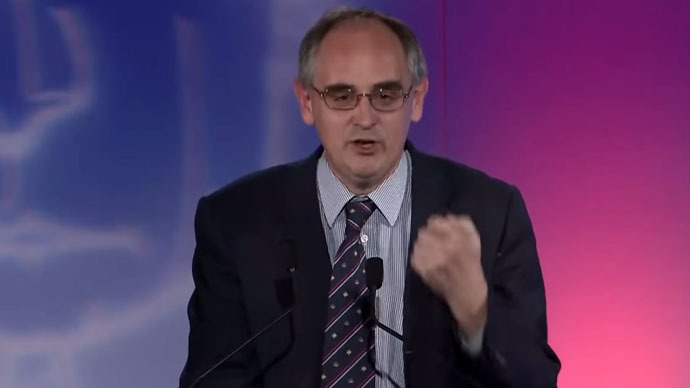Why do some of the “moral leaders” of the West get so excited about the Russian media not agreeing with them?
Edward Lucas, the senior editor at The Economist magazine, made in fact a self-defeating confession in his speech at the Munich security conference: “Why do people watch RT so avidly? Because they think that the mainstream media is not telling them the truth and they are fed up with the political elite in our countries.”
Sorry, Mr. Lucas, but in what way is this situation in the West different from the state of affairs in Brezhnev’s Soviet Union, where people no less avidly tuned in to the BBC and Radio Free Europe? People in the USSR did it for the same reasons - because they thought that the “mainstream” Soviet media was not telling them the truth and because they were fed up with the political elite in their country (which now became 15+ different countries).

RT responds to ‘ostracism’ calls by Economist editor at Munich conference
Of course, in the view of Mr. Lucas, this is an unbearable situation. History knows two ways to remedy it. One was tried by Mr. Gorbachev who stopped jamming Western stations in 1987-1988 and allowed internships of Western journalists in Russia and of Soviet journalists – in Western publications. The other one had been tried before Gorbachev by Brezhnev and many others, who jammed the foreign radio and arrested the locals who dared to work for it. Now Mr. Lucas is actually proposing to use Brezhnev’s tactics, temporarily replacing arrests with ostracism:
“I think we could do a bit more ostracism,” Mr. Lucas said at the Munich conference. “I’m quite happy to say that if anyone puts a CV on my desk, and on that CV I see they worked at RT or Sputnik or one of these things, that CV is going into the bin and not into the in-tray. We would not have accepted it during the Cold War that people could move from working for Pravda, or Izvestia, or TASS, and then into jobs in Western media. Far too many people see a job at RT as the first stage on a career ladder. It’s not. It’s the last stage on a career ladder.”
READ MORE: Epic fail! US diplomats find they can’t control the narrative on social media
How is this thinking different from the thinking of the KGB generals (whom Mr. Lucas likes to condemn so much), who made sure a job with Radio Free Europe would be the last stage on a career ladder for a young Soviet citizen in the early 1980s? (I have some acquaintances who had to go through such an ordeal.) Mr. Lucas should also take note that even in the early 1990s, still under the Soviet Union; journalists from some Soviet media were offered jobs and internships in Western media. Now Mr. Lucas wants to return to the preceding epoch, obviously.

How does all of this jive with Western values?
“The kind of language which some of the Western “leaders of opinion” use against their Russian opponents is detrimental to the Western values in the first place. Sanctions against Russia contradict the principle of free economic activity, the Magnitsky list was against the presumption of innocence, since some Russian citizens were declared criminals without a trial,” comments Ben Aris, chief editor of the Business New Europe internet news outlet.
One could add – certain words and actions of Edward Lucas and his comrade-in-arms, author of several fiery anti-Putin books, Ben Judah – some of these words and actions breach the rules of debate.
Since I took part in several radio discussions on the BBC World Service and Sky News with Lucas and Judah, I can testify that they never object to the essence of the opponent’s arguments. Instead, they prefer personal attacks. “There is no sense in listening to HIM,” Ben Judah said in a recent debate with me on Sky News. I had to retort that, when arguing with Mr. Judah, I criticized his line of argumentation and language (“Putin’s cleptocracy”, “Russia’s aggression”), and not his persona.
“This is a new low in the argumentation of Mr. Lucas,” Charles Bausman, Moscow-based American CEO of the Russia Insider internet resource commented. “In fact, whenever Mr. Lucas opens his mouth he becomes a great asset for the so called Russian propaganda that he likes so much to talk about.”
Indeed, the best propaganda you can do against Edward Lucas is just to quote him in full. His words speak for themselves.
Dmitry Babich, Political analyst, for RT.
The statements, views and opinions expressed in this column are solely those of the author and do not necessarily represent those of RT.
The statements, views and opinions expressed in this column are solely those of the author and do not necessarily represent those of RT.

